‘We’ve lost a good one’: Donald R. Dwight remembered as passionate advocate for local journalism
|
Published: 05-07-2025 6:00 AM
Modified: 05-07-2025 6:18 PM |
HOLYOKE — With family roots in the newspaper industry and many years serving as chairman of Newspapers of New England, Holyoke native Donald R. Dwight, who died at the age of 94 on Sunday, is being recalled for a life lived by the same principles that guided his commitment to locally owned, independent journalism.
“The principles he used in his approach to journalism were the same principles he lived his life by: integrity, respect and fairness,” said his son, Arthur Dwight. “He was a passionate advocate for that in journalism.”
Donald Dwight, who also served as lieutenant governor of Massachusetts from 1971 to 1975 alongside Republican Gov. Francis Sargent, started out professionally in the family’s newspaper business at the Holyoke Transcript-Telegram in the 1950s, and after his political career, returned to work in the print medium.
From April 1976 to November 1982, he was president and publisher of the Minneapolis Star and Minneapolis Tribune, eventually overseeing the merger of the newspapers into a morning edition and revolutionizing the production process. Then, he became chairman of NNE, eventually publishing seven New England newspapers, including both the Daily Hampshire Gazette and the Greenfield Recorder, and owning half of the enterprise that began as an outgrowth of the Holyoke newspaper.
“He was that professional, that outstanding boss to some, that outstanding colleague to others,” said Nancy Dwight, his widow, who continues to serve on the NNE board. She also has been the mother and stepmother to his seven children and 11 grandchildren, soon to be 12.
Laura Dwight recalls her father as a word man from a newspaper family, with the Holyoke Transcript-Telegram run by his grandmother, Minnie Ryan Dwight, and then his father William Dwight Sr.
“He was meticulous about how words were used and pronounced, and entertained his children by saying aloud the poem, ‘The Midnight Ride of Paul Revere’ by Longfellow from memory,” she said.
In 2005, Donald Dwight was instrumental in bringing the Gazette into the fold of the seven newspapers across the region, after approving the purchase from H.S. Gere & Sons Inc.
Article continues after...
Yesterday's Most Read Articles
 17-year-old Hatfield resident killed in Deerfield crash
17-year-old Hatfield resident killed in Deerfield crash
 80th Invitational Four Ball: Cody Booska and Chris Bourbeau take down Dave Kennedy and Nate Burdick to capture championship at Country Club of Greenfield.
80th Invitational Four Ball: Cody Booska and Chris Bourbeau take down Dave Kennedy and Nate Burdick to capture championship at Country Club of Greenfield.
 Several area departments put out Northfield house fire
Several area departments put out Northfield house fire
 Erving man, 60, found dead in Montague Plains Wildlife Management Area identified
Erving man, 60, found dead in Montague Plains Wildlife Management Area identified
 New role focused on downtown development in Northfield, Turners Falls and Shelburne Falls
New role focused on downtown development in Northfield, Turners Falls and Shelburne Falls
 Shutesbury begins police chief search
Shutesbury begins police chief search
At the time of the acquisition, Dwight prepared the information explaining how the DeRose family, as publishers of the Gazette, had intertwined with the Dwight family through their grandmothers Harriet Williams DeRose and Minnie Ryan Dwight, editor and publisher of the Holyoke Transcript-Telgram. That article also provided an overview of not only their publishing efforts, but the launch of the WHYN radio station.
Aaron Julien, chairman of Newspapers of New England, praised Donald Dwight’s leadership and the historical commitment to setting high-quality journalism.
“Don believed in what we were doing: Strong local papers, family owned,” Julien said. “He cared deeply about the quality of the journalism, and his hard work, support and foresight helped keep that vision going.”
In fact, during his time as lieutenant governor, Dwight was quoted that the news media is not a government utility, and if seen in that way would fall under government control.
“No other business in this world is so free from government restraint. May it ever be thus,” he said.
As a 10-year-old, Dwight had delivered cardboard-like impressions of advertisements, or mats, to the major advertisers for the Holyoke Transcript-Telegram and then during World War II he wrapped newspapers in the afternoon that would be mailed to service members. After two years at Holyoke High School, Dwight went to Deerfield Academy, where he edited The Deerfield Scroll. At Princeton University, he studied American history with a particular interest in the Civil War period. He then served two years active duty in the U.S. Marine Corps, followed by six years of reserve service, separating in 1961 at the rank of captain.
Following his military service, he started as a police reporter at the Transcript-Telegram and cycled through all areas of the paper before being given management responsibility.
Nancy Dwight said her husband shared a belief in bringing news to the people, whether in print, which had been at the core, or online, through iPads and smartphones, or any other mechanism.
“He cares deeply about the news industry,” she said. “That sort of leadership, to be experimental, but to always give the people the news in ways they can consume it.”
His progressive attitudes were exhibited in the political world in 1972, when, even as lieutenant governor and the ongoing debate over the Equal Rights Amendment, he agreed to cede his position as Massachusetts delegate to the Republican National Convention. That allowed women and more young people to be delegates and to reflect a diverse party.
Even though he had been semi-retired in South Carolina, having an opportunity to take up golf, his heart was always in Holyoke, Nancy Dwight said. He would often come to the Holyoke Rotary Club to give out the annual Dwight Award established in memory of his father and Holyoke Transcript-Telegram publisher William G. Dwight.
“He used any excuse to get back to Holyoke, that’s where his heart was,” Nancy Dwight said.
Laura Dwight said one of the final acts for her father was his persistent work to have recognition from the Marine Corps Museum that a photo of his brother, Bill Dwight Jr., be identified.
Arthur Dwight worked for two years at The Daily Item in Lynn, abiding by his father’s mantra of always getting stories right, having multiple sources and being fair.
“That inspired me; I always heard that counsel in my head,” Dwight said of his father. “The principles he lived his life inspire to always do better and always do the right thing.”
Nancy Dwight said when her husband turned 94 in March, she made sure that friends and family had a chance to visit and offer well wishes.
“We’ve lost a good one,” she said.

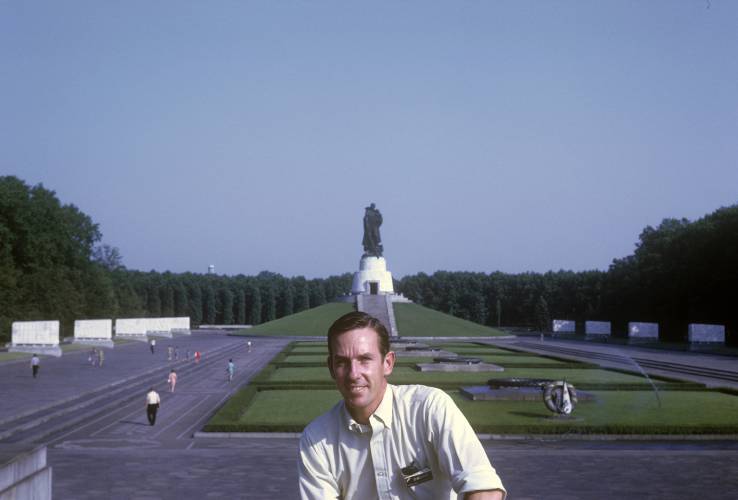
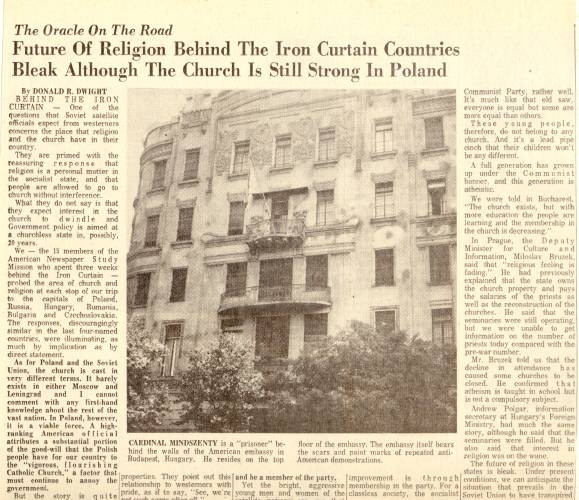
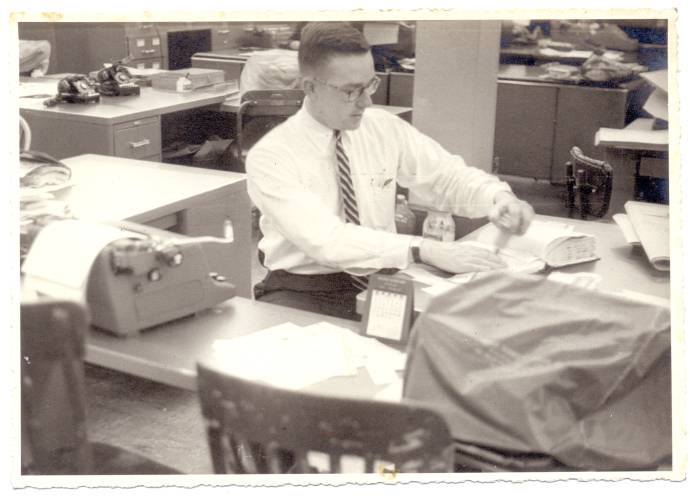
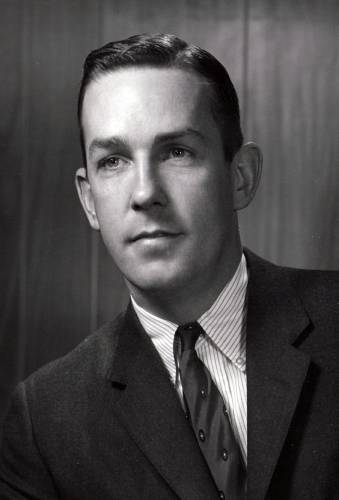
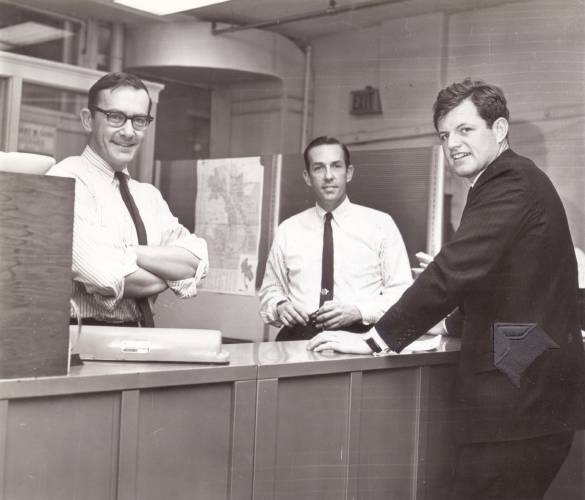
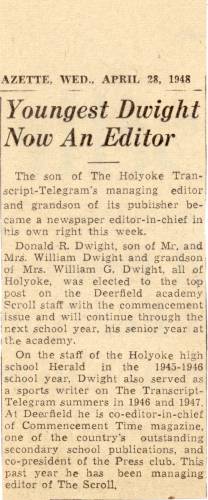





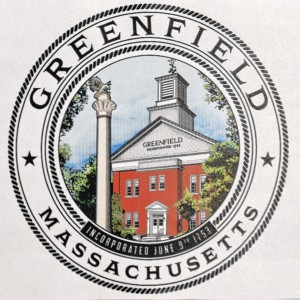 Greenfield Health Board to review tobacco license regs
Greenfield Health Board to review tobacco license regs Community rallies to support family of Hatfield teen in fatal crash
Community rallies to support family of Hatfield teen in fatal crash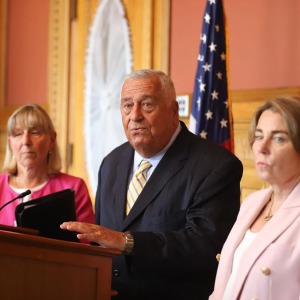 Bar advocates dispute Beacon Hill's forecast for labor crisis resolution
Bar advocates dispute Beacon Hill's forecast for labor crisis resolution Ashfield mulls regionalizing emergency services
Ashfield mulls regionalizing emergency services
